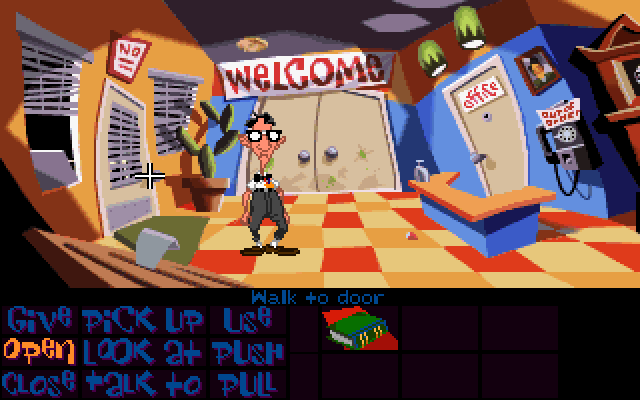The parsing is quite primitive. Here’s a bit of code from the PARSER routine in Deadline:
(<OR <EQUAL? .WORD ,W?CAREFULLY ,W?QUIETLY>
<EQUAL? .WORD ,W?SLOWLY ,W?QUICKLY
,W?BRIEFLY>>
<SETG P-ADVERB .WORD>)
Which I think means that if any of these words appear anywhere in the command, that’s the adverb. Actions can then check what P-ADVERB is.
Sometimes it’s just cosmetic, as in this example:
>CLIMB STAIRS QUIETLY
The stairs are still quite noisy even when walking up very slowly.
Stairs
You are on a landing halfway up the flight of stairs. You notice that the stairs
do indeed make quite a noise when stepped upon.
One example from Seastalker has a much bigger impact. In the crawl space of the submarine, all your commands will go through this routine:
<ROUTINE CRAWL-SPACE-F ("OPTIONAL" (RARG <>))
<COND (<==? .RARG ,M-BEG>
<COND (<EXIT-VERB?> <MOVE ,ENGINE ,SUB> <RFALSE>)>
<COND (<GAME-VERB?> <RFALSE>)>
<COND (<==? ,P-ADVERB ,W?CAREFULLY> <RFALSE>)>
<COND (<AND <PROB 20 ;10>
<FSET? ,ENGINE ,ONBIT>
<NOT ,SUB-IN-TANK>
<NOT ,SUB-IN-DOME>>
<TELL
"|
Suddenly the " D ,SUB " begins to shake violently! Your foot has
knocked an engine bearing out of alignment! It will be necessary to
surface at once and await rescue! Your mission must be aborted.">
<FINISH>)
(<AND <PROB 20 ;10>
<FSET? ,GASH ,INVISIBLE> ;<NOT >>
<FSET ,ARM ,MUNGBIT>
<FCLEAR ,GASH ,INVISIBLE>
<TELL
"There's a sharp pain in your right arm! A flood of wet warmth and a
spreading red stain mean you've seriously gashed your arm
on a sharp metal corner!" CR>
<RFALSE>)>)
Which, as I understand it, means:
- Leaving the room (
EXIT-VERB?) is safe.
- Meta-verbs (“VERBOSE”, “SAVE”, “SCORE”, etc.) are safe.
- Any action that’s done “carefully” is safe.
- Otherwise, there’s a 20% chance that you’ll either wreck the submarine (if the engine is on) or injure your arm.
And that’s just annoying!
What I found at a quick search through the code (but haven’t always verified in game):
- [Deadline] Examining the note paper carefully will reveal indentations on it.
- [Deadline] Examining or reading the newspaper carefully is the same as reading the second section.
- [Deadline] Examining the bookshelves carefully should reveal the hidden button if George has used it, even if you didn’t see him do it.
- [Deadline] Climbing up the stairs quietly or slowly will tell you they’re still noisy.
- [Deadline] Reading or examining something carefully takes more time.
- [Witness] I think the game prevents you from examining objects in the office carefully while you’re sitting down. It’s a bit unclear to me.
- [Witness] Apparently there’s a difference between comparing Stiles’s shoes to plaster casts of footprints and doing it carefully. One may tell you they seem to match, while the other may tell you they match perfectly. (Putting the cast on the shoes has the same effect.) But the game doesn’t seem to actually use the information that you’ve matched the footprints perfectly, even though it sets a variable to indicate that you’ve matched them.
- [Witness] Same thing with the boots, but this time the information that you’ve matched them seems to actually be used, albeit only (?) to say that this is not enough to incriminate Phong.
- [Witness] You can find the medical report by searching Monica’s dressing table carefully, even before she tells you about it.
- [Witness] You can examine Mr. Linder’s papers carefully, and the game will tell you that you look more thoroughly instead of quickly. You still won’t find anything.
- [Witness] Examining the clock carefully after the murder will reveal the powder around the keyhole, without having to examine the keyhole separately.
- [Witness] Comparing the green wire to the green wire spool carefully says they fit perfectly, rather than just appearing to be similar. Again, the game doesn’t seem to do anything with this information, even though it sets a variable to flag that you’ve matched them.
- [Witness] If you compare the two handguns carefully it will say they are virtually identical, rather than just appearing to be very similar. Again, a variable is set to flag that you’ve made the match but it’s not used.
- [Witness] Reading or examining things carefully takes longer.
- [Cutthroats] Doing anything slowly takes more time, same as if you’re thirsty, hungry, drunk, or tired. I think.
- [Seastalker] It looks like the adverb “privately” can be used as an alternative way of asking or telling about a private matter.
- [Seastalker] “SEARCH ROOM CAREFULLY” takes longer time than just “SEARCH ROOM”, and the game will say “careful search” instead of “brief search”.
- [Seastalker] Examining the file drawer near the start of the game carefully will say that you look more thoroughly, instead of quickly. You still won’t find anything, though.
- [Seastalker] If you examine the submarine’s reactor carefully, the game will refer you to the manual.
- [Seastalker] The aforementioned crawl space nonsense.
- [Seastalker] Examining or reading any object carefully takes more time.
I may have missed a few.
Either way, I get the impression that it was an idea that originated with Deadline, lived on in a few games, but never really caught on. And that’s a good thing, if you ask me.
